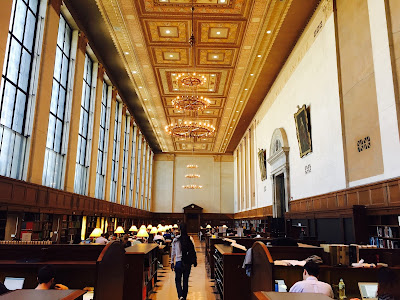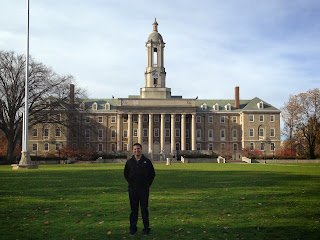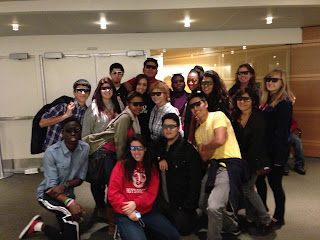Reflections from Summer I
Wow. I honestly cannot believe that we are already finished with Summer I of Columbia University's Summer Principals Academy (SPA). These last six weeks have been such an incredible learning experience, and I feel fortunate to have had the opportunity to work with some of the best educators across the country. It was a much-needed break from the horrendous end of the school year I just went through. Between all of the student walkouts, teachers quitting daily, and (in my perspective) terrible leadership, I asked myself for the first time in my life whether there is a point when education reform goes too far. To be honest, the last four months of this past school year were the hardest four months of my career, and I was ready to put this year behind us.
 |
| The main reading room in the Butler Library |
 |
| "In some cases, you can fake it until you make it. You cannot fake it in SPA." |
 |
A map representing our cohort by region.
|
 |
Enjoying 4th of July in Brooklyn!
|
This July, we took 14.5 credits in five weeks, meaning that we were busy! We took Introduction to School Leadership and Decision Making, School Leadership for Adult Development, Supervision of Teaching and Learning, Basic Practicum in Conflict Resolution, and Program Development: Teaching, Learning and Assessment. We also took a 1-credit equity series class, which features classes such as emotional intelligence, culturally relevant pedagogy, and examining the district/charter schools debate. I made the decision to stay on campus this summer, so that I could devote all of my time to school. I recognize that I am extraordinarily privileged to be able to do that, and have so much respect for my peers that had to leave behind their families this summer to attain a transformative school leadership experience.
 |
My incredible TC SPA #squad
|
 |
| (The last day of 5018 Adult Development) |
The two classes that had the biggest intellectual impact on me was, without question, adult development and conflict resolution. As I wrote in my reflection paper, it is hard to believe how much I have grown as a leader, and perhaps more importantly as a person, over the course of the three weeks in 5018: Adult Development. Going into that class, I was excited to learn about adult developmental psychology, as it was something that I had neither previously considered nor studied. Although I knew that everyone had their own lenses in which they observed and made meaning of the world, I never had the academic language to fully articulate my feelings towards adults that make meaning of life in different ways. This course pushed my thinking in multiple aspects, both personally and professionally. Perhaps most prominently, I left that class with renewed feelings of optimism and excitement, and personally feel that the practical applications of the theory from 5018 has the potential to really make a transformational impact in the lives of others. One of the most important lines that Dr. Drago-Severson has repeated throughout the course is that, although you can never force an adult to develop, “you can create an environment in which adult development is possible.” This is something that will stay with me for a long time. I also sense the urgency in this course; in the globally connected and ever-changing 21st century, where we are faced with challenges that are highly adaptive in nature, true leadership not only takes true courage, grit, and perseverance, but some level of self-authoring capacity. In synthesis, adult development is something that is not simply ideal but is rather an ideology that must be studied and practiced if we are serious about pushing our country and thus our world forward.
 |
| Our cohort presented Dr. Drago-Severson with a pillow so she can always be "well held." |
In our conflict resolution class, I read on the syllabus that we were actually going to run a prisoner’s dilemma on the first day of class. Having read about the prisoner’s dilemma (including having had the opportunity to write a paper on the topic during undergrad), I was personally very excited to hear that we were going to be acting out the prisoner’s dilemma on the first day of class. Although I was ready for the challenge, the nature of separating the two groups and placing us into two different floors made this much more realistic than I ever could have imagined by simply reading theory. When the two groups first separated, my outlook was to maximize both teams’ returns and fully “cooperate;” after coming from a transformational adult development course that literally ended the day before, I thought that most of my peers were thinking in similar ways. In hindsight, I found that I could not have been more wrong. As previously mentioned, during these heated debates with my colleagues about what the best course of action should be, I learned very quickly that it is one thing to study the prisoner’s dilemma and another entirely to actually participate in it. Reflecting back on the activity, I thought that I had originally convinced my group to cooperate early on in the activity, and since the other group was willing to cooperate, I wrongly thought that the adaptive challenge was completed. As we kept going back and forth, and both teams picked “blue” (to cooperate), I felt that we had sealed the deal. Unfortunately, many of my teammates’ values were seemingly thrown out the figurative window during the last round when our group decided to vote for “red.” I tried my best to persuade my group to go along for the greater good, but in the end, my efforts were fruitless. Even though I felt as though I did the right thing, I was still upset because our group ended up looking out for our own interests exclusively, screwing over the other group in the process. It was rather disconcerting to hear some of my peer’s rationales and opinions about why they choose to “get ahead at the cost of others.” I feel that, looking at the greater picture here, and as we all are aspiring school leaders, we need to be open and willing to collaborate together by constantly looking out for the best interests of all of our children. During this experience, we had an opportunity to let both groups win, and our group chose to be selfish and take advantage of the situation. Even though this was just a game, it was clear that many people had a deep and emotionally charged reaction to the activity. For me, the prompt also had me beg the question, “at what point does this game become reality?” Although it was an interesting exercise and a great way to start a conflict resolution class, I felt that this gave me tremendous insight into certain people’s true personalities while bringing me closer to other individuals, as well. Regardless, it was a fantastic learning experience that will always serve as a personal reminder about why we should always be looking to “do the right thing.” I really feel as though this basic practicum in conflict resolution has given me both the intellectual rational and technical skills needed to truly make a difference when involved in a conflict situation.
 |
| Arianne and Jacklyn looking for the owl |
The only class I was particularly disappointed with was our Program Development: Teaching, Learning and Assessment class. I was originally really excited when I heard that one of the former deputy chancellors of the NYC Department of Education (under Joel Klein) was going to be one of our professors. I learned very quickly that although he might have been a great #2 person running the DOE or he understood the NYC bureaucracy incredibly well, he did not know much about effective teaching. This was made evident when he showed us an “exemplar” math classroom that really was nothing special. I also did not appreciate how he treated graduate students like middle schoolers, but perhaps that is a story for another day…
 |
| The front entrance of Teachers College |
Overall, it was such a transformational summer; one that I really needed. I am so excited to shadow some awesome school leaders in the fall, start my New School Design project, and get ready for the fall semester. Now, I am off to Buenos Aires! ¡Hasta la próxima vez!



Comments
Post a Comment